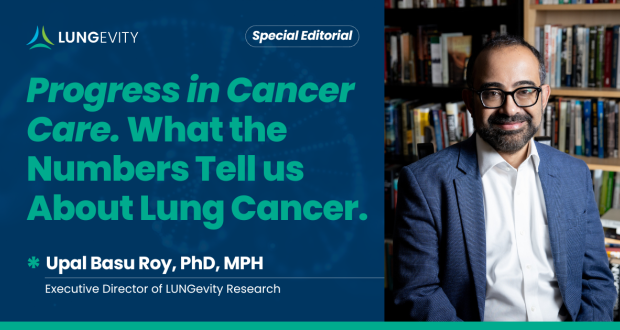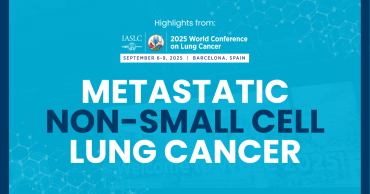-
Progress in Cancer Care: What the Numbers Tell Us About Lung Cancer
Every January, the American Cancer Society releases a Cancer Facts & Figures report. It provides a clear view of where we stand in addressing cancer. The 2026 report brings both encouraging news and a...
IN THE SPOTLIGHT
-
Artificial Intelligence in Lung Cancer: Hope vs. Hype
Artificial intelligence (AI) is rapidly reshaping the future of cancer care, but such dramatic innovation also brings important questions. AI has evolved from early consumer tools... -
Biggest News from Berlin: Research Highlights from ESMO
Lung cancer research was in the spotlight at the European Society for Medical Oncology (ESMO) meeting held October 17-21, 2025, in Berlin, Germany. With approximately 30,000... -
The Future of Lung Cancer Starts Here
For more than two decades, LUNGevity Foundation has been a leader in advancing lung cancer research. Since 2002, we have invested $55+ million in more than 200 research projects... -
LUNGevity Foundation Invests $1.2 Million to Fuel Next Generation of Lung Cancer Research
LUNGevity Foundation announced $1.2 million in research awards that are designed to strengthen the lung cancer workforce and accelerate progress across the lung cancer continuum... -
Celebrating Progress in Lung Cancer: From Detection to Survivorship
Over the past twenty years, lung cancer research and care have entered a new era. One filled with hope, innovation, and progress that is transforming what it means to face a lung... -
Aiming for a Cure: How CD74 Research Could Eliminate Drug-Resistant Lung Cancer for Good
Lung cancer remains the leading cause of cancer death worldwide. Over the past two decades, the development of targeted therapies, particularly tyrosine kinase inhibitors (TKIs)... -
New Insights in Treating Metastatic Lung Cancer from WCLC 2025
For people with advanced or metastatic non-small cell lung cancer (NSCLC), the treatment landscape has changed dramatically in recent years. Researchers are learning how to... -
EGFR Virtual Meetup
EGFR patients/survivors - Join us the 1st Wednesday of every month to connect with others who share common experiences and build your community. -
6 Tips for Managing Scanxiety
Read time: 4 minutes. Scanxiety is a term used for the anxiety someone feels as a medical exam, like an MRI or CT scan, approaches. It can come with feelings of dread or worry, as...
Artificial Intelligence in Lung Cancer: Hope vs. Hype
Artificial Intelligence in Lung Cancer: Hope vs. Hype
Artificial intelligence (AI) is rapidly reshaping the future of cancer care, but such dramatic innovation also brings important questions.AI has evolved from early consumer tools (like autocorrect on phones, customer service chatbots, and personalized shopping recommendations) to advanced systems with the potential to revolutionize biomedical discovery and patient care. While there is tremendous excitement around AI, there is also a critical need to use it responsibly.Researchers are actively…
Biggest News from Berlin: Research Highlights from ESMO
Biggest News from Berlin: Research Highlights from ESMO
Lung cancer research was in the spotlight at the European Society for Medical Oncology (ESMO) meeting held October 17-21, 2025, in Berlin, Germany. With approximately 30,000 attendees from over 100 countries, this meeting gathered an international audience of clinicians, researchers, patient advocates, and representatives from the healthcare industry to discuss cutting-edge cancer research and share practice-changing clinical trial data. We saw data from studies that aim to build upon…
New Insights in Treating Metastatic Lung Cancer from WCLC 2025
New Insights in Treating Metastatic Lung Cancer from WCLC 2025
For people with advanced or metastatic non-small cell lung cancer (NSCLC), the treatment landscape has changed dramatically in recent years. Researchers are learning how to optimize existing therapies and are exploring entirely new treatment approaches. At the 2025 World Conference on Lung Cancer (WCLC), several studies highlighted progress in treating newly diagnosed individuals as well as those who need new options after standard therapies stop working. Combining Chemotherapy and…
New Treatment for Patients with Metastatic NSCLC with EGFR Exon 20 Insertion Mutations
New Treatment for Patients with Metastatic NSCLC with EGFR Exon 20 Insertion Mutations
On July 2, 2025, the US Food and Drug Administration (FDA) announced the accelerated approval of sunvozertinib (Zegfrovy®) to treat patients with locally advanced or metastatic non-small cell lung cancer (NSCLC) with EGFR exon 20 insertion mutations (exon20ins). These mutations are found in approximately 2% of patients with NSCLC. Sunvozertinib is a tyrosine kinase inhibitor (TKI) that targets EGFR exon20ins in patients whose tumors have started to grow again after chemotherapy.The FDA…
Understanding DTPCs: A Path to Ending Drug Resistance in Lung Cancer
Understanding DTPCs: A Path to Ending Drug Resistance in Lung Cancer
When a person is treated for advanced-stage lung cancer, tumors will often shrink, and their symptoms may subside. An effective treatment will kill many tumor cells, but there are usually some cells (called drug-tolerant persister cells, or DTPCs) left behind. If these cancer cells survive treatment, they will eventually begin to grow again.Researchers have been making progress in understanding how DTPCs grow and, importantly, how that growth can be stopped. As we learn more about these cells,…
New ADC Treatment Approved for Advanced EGFR+ NSCLC
New ADC Treatment Approved for Advanced EGFR+ NSCLC
On June 23, 2025, the US Food and Drug Administration (FDA) announced the approval of datopotamab deruxtecan-dlnk (Datroway® or Dato-DXd) to treat patients with locally advanced or metastatic non-small cell lung cancer (NSCLC) with mutations in the EGFR (epidermal growth factor receptor) gene. This approval is for patients who have been previously treated with an EGFR-directed therapy and chemotherapy. This ADC, or antibody-drug conjugate, is designed with two key elements. One part…
Surviving LMD: Michelle Never Settled for “No”
Surviving LMD: Michelle Never Settled for “No”
Michelle knew what was wrong. She knew the headaches, regular vomiting, ear popping, and “whooshing” sounds in her head were all signs of leptomeningeal disease (LMD). The issue, however, is that LMD is so rare—only diagnosed in 5% of people with cancer—she had to advocate for the testing to prove it.“I called my clinic and said I needed a brain MRI because I think I have LMD. They didn’t want to schedule one, so I said, tell my doctor I’m demanding a brain MRI. I can tell him directly if I…
What Are Antibody-Drug Conjugates and How Do They Treat Lung Cancer?
What Are Antibody-Drug Conjugates and How Do They Treat Lung Cancer?
Historically, approaches to treating lung cancer included surgery, radiation, and chemotherapy. The past decade ushered in a new era of treatments with targeted therapy and immunotherapy. Now, we are seeing the emergence of another class of lung cancer treatments called antibody-drug conjugates (ADCs), that are a combination of targeted therapy and chemotherapy.ADCs act like a “smart chemotherapy” that aim to deliver the drug compound directly to cancer cells, reducing harm to healthy tissue.As…
Integrative Oncology and Lung Cancer: Adding Complementary Therapy
Integrative Oncology and Lung Cancer: Adding Complementary Therapy
What Is Integrative Oncology? Integrative oncology is the use of complementary therapies alongside conventional lung cancer treatments like chemotherapy, targeted therapy, surgery, or immunotherapy. Integrative oncology—also called integrative medicine—is an evidence-informed whole-body approach to health. It is often used to address symptoms and side effects caused by disease or treatment and improve overall quality of life. Specific examples of integrative oncology for lung cancer…
What Should Patients Know About Lung Cancer Surgery?
What Should Patients Know About Lung Cancer Surgery?
Surgery is a treatment option for early-stage lung cancer that involves removing all or part of a lung to treat a cancerous tumor. It is primarily an option for people with non-small cell lung cancer (NSCLC) staged at I, II, or IIIA. Surgery is rarely considered for tumors at stage IIIB or IV because those lung cancers have spread to other parts of the body. It is also rarely used to treat small cell lung cancer (SCLC) because SCLC is typically diagnosed at a later stage. Types of…
How Do We Treat Early-Stage NSCLC in 2025?
How Do We Treat Early-Stage NSCLC in 2025?
Roughly 20% of lung cancer is diagnosed as early-stage disease, and researchers have been working to improve treatment options for these patients—with significant success. Last September, as part of LUNGevity’s International Lung Cancer Survivorship Conference, we hosted a session on the progress in treating early-stage non-small cell lung cancer (NSCLC) with Dr. Jarushka Naidoo of Beaumont RCSI Cancer Centre in Ireland and Dr. Amy Moore of LUNGevity Foundation. In October,…
Real-World Examples of Patient Involvement in Designing Clinical Trials
Real-World Examples of Patient Involvement in Designing Clinical Trials
Read time: 2 minutes.Here we present the final video in our three-part series about how patients and researchers can work together to develop clinical trials. In the video below, LUNGevity again partnered with Rising Tide for Clinical Cancer Research to illustrate the power of having patients contribute to the research process. We use a real-world example to learn about patient-researcher collaborations through the POSITIVE study, a breast cancer-focused clinical trial. You can…
Developing Clinical Trials that Account for the Realities of Patient Life
Developing Clinical Trials that Account for the Realities of Patient Life
Read time: 2 minutes. We are pleased to continue our three-part series about how patients and researchers can work together to develop clinical trials. In this second video, LUNGevity again partnered with Rising Tide for Clinical Cancer Research to show how researchers and patient advocates can be empowered with tools to create clinical trials that resonate with patients and address the key issues they care about. If you missed the first video, How Can Patients…
The 5 Most Popular Lung Cancer Blogs From 2024
The 5 Most Popular Lung Cancer Blogs From 2024
Read time: 3 minutes. Throughout 2024 we published blogs sharing scientific meeting recaps, educational content, personal stories, treatment news, and so much more. Below are the most popular articles we published in 2024. If you’re looking for survivor features and personal stories, you can see all the lung cancer survivors we highlighted in 2024 right here. 2024 ASCO: Highlights of Lung Cancer Research In June, we recapped the annual American Society of…
Brain Mets Basics for NSCLC: What Are Brain Metastases and How Do We Treat Them?
Brain Mets Basics for NSCLC: What Are Brain Metastases and How Do We Treat Them?
Read time: 2 minutes. Brain metastases (also called brain mets) develop when cancer from somewhere else in the body spreads to the brain. Over time, tumors can become metastatic (travel to other parts of the body). When lung cancer travels to the brain, it requires specialized treatments that can cross the blood-brain barrier. The blood-brain barrier is a tight network of blood vessels and tissue that allows some substances, such as oxygen and water, into the brain while…
Screening and Early Detection of Lung Cancer: Highlights from WCLC and ESMO 2024
Screening and Early Detection of Lung Cancer: Highlights from WCLC and ESMO 2024
Lung cancer screening and early detection were major topics of discussion at the World Conference on Lung Cancer (WCLC), held in San Diego from September 7-10, and the European Society for Medical Oncology (ESMO) conference in Barcelona from September 13-17. This fourth and final blog in our series of updates summarizes highlights from these discussions. You can read the other update blogs from these fall science meetings: Metastatic NSCLC Highlights Small Cell Lung Cancer…
How Do Drugs Get Approved (and Fast-Tracked) by the FDA?
How Do Drugs Get Approved (and Fast-Tracked) by the FDA?
Read time: 5 minutes. This is Part 3 in our series on how drugs get approved to treat lung cancer. Part 1: Understanding Clinical Trials - Why Are They Important for Drug Development? Part 2: How We Define Success for a Clinical Trial The United States federal government aims to regulate prescription drugs to ensure people are receiving medication that’s safe and effective. Every prescribed drug in the U.S. has gone through a rigorous testing process that can…
New Chemotherapy-Free Treatment Combination Approved for EGFR+ Lung Cancer
New Chemotherapy-Free Treatment Combination Approved for EGFR+ Lung Cancer
On August 19, 2024, the US Food and Drug Administration (FDA) approved a new treatment option for people newly diagnosed with locally advanced or metastatic non-small cell lung cancer (NSCLC) whose tumors have EGFR exon 19 deletions or exon 21 L858R mutations. The recent approval offers a new chemotherapy-free treatment for patients—the combination of lazertinib (Lazcluze™) with amivantamab-vmjw (Rybrevant®). Prior to this approval, treatment with osimertinib (Tagrisso®) alone…
How We Define Success for a Clinical Trial
How We Define Success for a Clinical Trial
Read time: 6 minutes. This is Part 2 of 3 in our series on how drugs get approved to treat lung cancer. Make sure to read Part 1 on the phases of clinical trials and why they are important for new drug development. We all want a treatment for lung cancer that is completely safe and entirely effective. While researchers are working toward that goal, the reality is we aren’t there yet. Every treatment we are considering comes with potential benefits and side effects. The…
Understanding Clinical Trials: Why Are They Important for Drug Development?
Understanding Clinical Trials: Why Are They Important for Drug Development?
Read time: 3 minutes.This is Part 1 in a 3-part series explaining how new drugs and treatments get approved to treat lung cancer. Parts 2 and 3 will be published in the coming weeks.Have you ever wondered how a new medicine or drug to treat lung cancer is brought to the people who need it? That’s what clinical trials help us do.According to the National Cancer Institute, a clinical trial is a type of research study that tests how well new medical approaches (such as screening tests, prevention…
Countdown to ILCSC24: Bringing the World’s Experts Right to Your Living Room
Countdown to ILCSC24: Bringing the World’s Experts Right to Your Living Room
Read time: 3 minutes. One of LUNGevity’s two flagship survivorship events, the International Lung Cancer Survivorship Conference (ILCSC), is being held virtually September 20 – 21, 2024. This is a free, online event that allows people with lung cancer and caregivers from around the world to join from the comfort of their own homes and hear from a star-studded lineup of lung cancer experts discussing the latest advances in research and treatment. You can register today for…
How Can Patients and Researchers Design Clinical Trials Together?
How Can Patients and Researchers Design Clinical Trials Together?
Read time: 2 minutes. Traditionally, people associate getting involved in lung cancer research with enrolling in a clinical trial. But most don’t realize they can also partner with researchers behind the scenes and get involved in designing clinical trials. In the first of a three-part series, Rising Tide Foundation for Clinical Cancer Research has partnered with LUNGevity to understand the role people with lung cancer can play in developing clinical trials. Through panelist…
Safely Bring Yoga, Dietary Supplements, Exercise, and More into Your Lung Cancer Journey
Safely Bring Yoga, Dietary Supplements, Exercise, and More into Your Lung Cancer Journey
Read time: 2 minutesIntegrative oncology adds holistic approaches—such as acupuncture, nutrition, exercise, and mindfulness—into a treatment plan. Research shows these interventions can have a tremendous impact on people going through lung cancer treatment and their quality of life. Unfortunately, they are also topics riddled with myths and falsehoods. LUNGevity spoke to an expert to help sort out the facts from the fiction. In the webinar below, Gabriel Lopez, MD, medical director of…
Chemo Shortage Didn’t Materialize ‘The Way We Initially Feared’
Chemo Shortage Didn’t Materialize ‘The Way We Initially Feared’
This March, LUNGevity Foundation partnered with CURE for their “Speaking Out” video series, inviting Amy Moore, PhD, vice president of global engagement and patient partnerships at LUNGevity Foundation, to discuss recent chemotherapy shortages. During the interview, Dr. Moore addressed the critical issues posed by the chemotherapy shortage, offering valuable insights into its origins, impact on people with lung cancer, available alternatives, and ongoing efforts to address disparities. Her…
FDA Approves New Treatment Option: Osimertinib Plus Chemotherapy for EGFR+ NSCLC
FDA Approves New Treatment Option: Osimertinib Plus Chemotherapy for EGFR+ NSCLC
The US Food and Drug Administration (FDA) approved a new treatment option for people diagnosed with locally advanced or metastatic non-small cell lung cancer (NSCLC) whose tumors have EGFR exon 19 deletions or exon 21 L858R mutations.Prior to this approval, treatment with osimertinib alone was the gold-standard targeted therapy for this population. The recent approval offers another option to patients – the combination of osimertinib with chemotherapy. This FDA approval is based on the…
Lung Cancer Masterclass: Get Smart About Lung Cancer
Lung Cancer Masterclass: Get Smart About Lung Cancer
In the past five years, the lung cancer community has seen an astonishing number of new treatments. As our understanding of lung cancer has deepened, the older treatment approaches have also become more effective and efficient. These options are fantastic steps toward improving the overall survival and quality of life for people living with lung cancer, but it can be difficult for patients and caregivers to keep track of the new drug treatments and scientific advancements. …
Questions to Ask About Clinical Trials
Questions to Ask About Clinical Trials
Asking your doctor and medical team questions about clinical trials is a helpful way to decide if they are a good fit for you. You may already have some in mind, but a few basic questions to ask and get answered before making a decision are:Do you know of any clinical trials for my type and stage of lung cancer?What are the benefits and risks of this clinical trial?What are the eligibility guidelines?How long does the study last?Will you still be in charge of my care?What are the costs, and…
Clinical Trial Phases
Clinical Trial Phases
The four phases of lung cancer clinical trials each serve a different and important purpose. From testing the safety of a new treatment to its effectiveness and long-term outcomes, this short video explains how researchers use clinical trials for new lung cancer treatments.Phases of a Clinical Trial:1. Safety of the new treatment 2. Does the cancer respond to the treatment 3. Is this new treatment better than the current options 4. Studies the long-term benefits and side effects
What Is a Clinical Trial
What Is a Clinical Trial
Lung cancer clinical trials are carefully designed research studies to evaluate and learn more about new drugs and treatments. They give people the ability to participate in lung cancer research and access to new treatments that otherwise may not be available to them, all under the close supervision of medical experts.
Watch Recorded Expert Sessions From ILCSC
Watch Recorded Expert Sessions From ILCSC
The International Lung Cancer Survivorship Conference (ILCSC) is a free virtual educational conference for people with lung cancer, caregivers, and advocates. The 2023 conference was held September 22-23. The recorded sessions from this conference are available to registered participants through December 21, 2023, at www.lungevity.org/ilcsc. If you did not register for the conference but would like to view the recordings, you may still register for free access. The recordings are…










